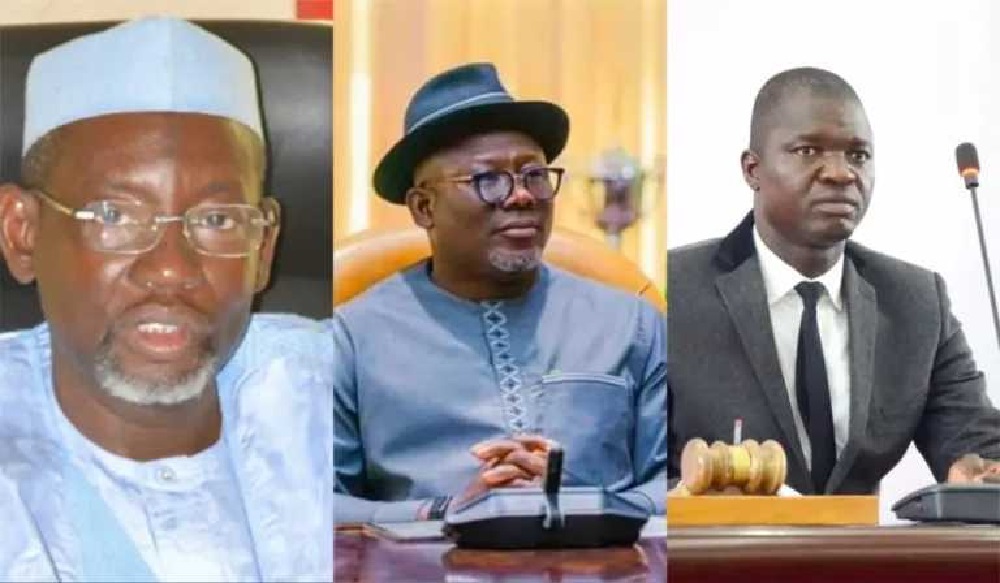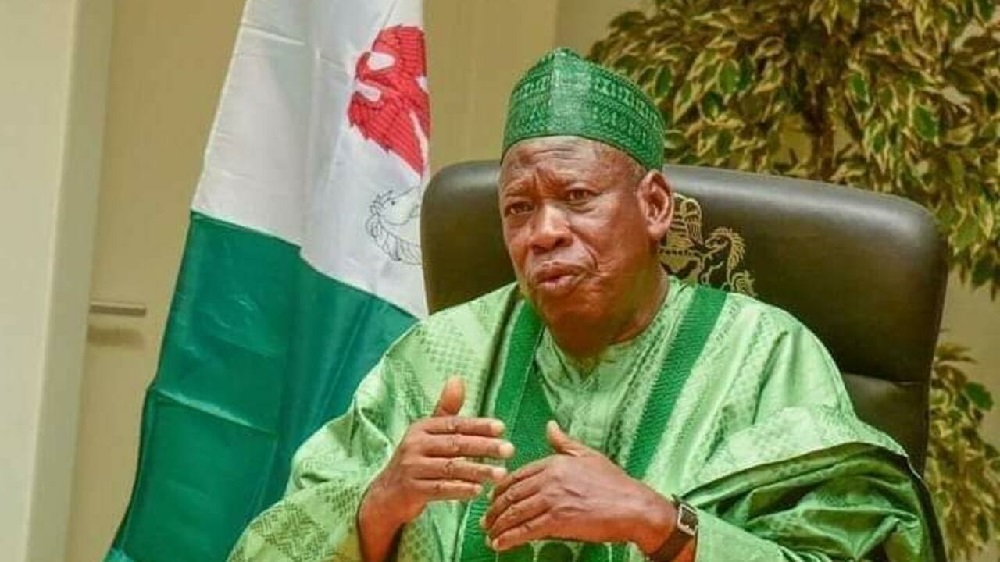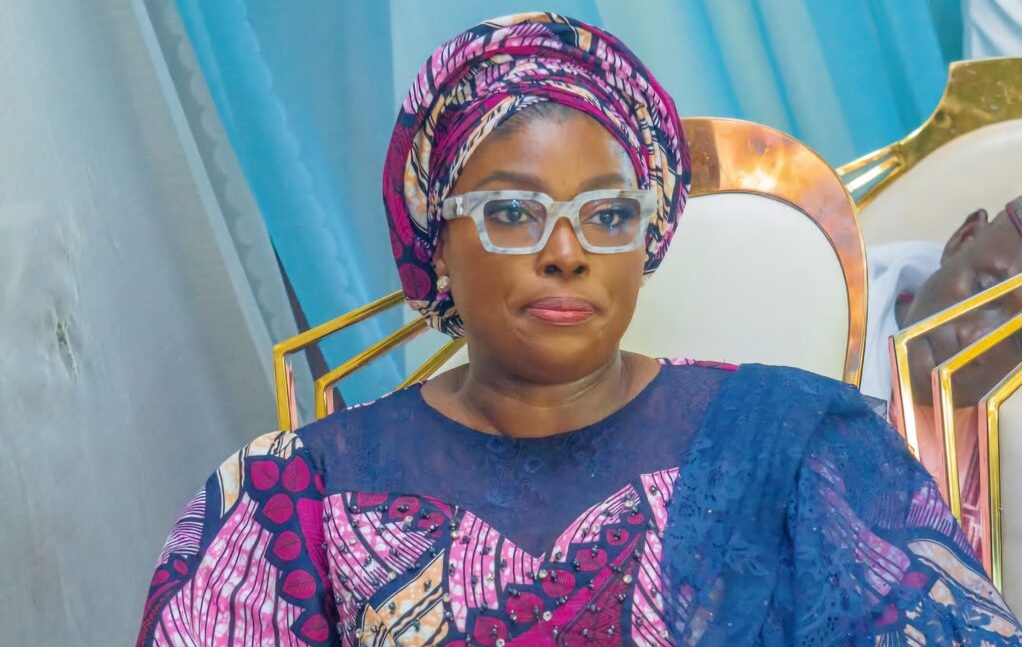Politics
One Year In Office: Check Out List Of State Governors Who Are Yet To Fight Their Predecessors

Twenty governors will mark their first year in office in less than ten days.
A few of them ascended to governorship through the endorsement of their predecessors, who cleared the path for them amidst a pool of other aspiring politicians.
In Nigeria, conflicts between political godfathers and their proteges, known as godsons, are quite common.
Some of the most notable recent conflicts include Rabiu Kwankwaso versus Umar Ganduje, Peter Obi versus Willie Obiano, Udom Emmanuel versus Godswill Akpabio, Adams Oshiomhole and Godwin Obaseki, Rauf Aregbesola and Gboyega Oyetola, among others.
Currently, the clash between Governor Siminalayi Fubara of Rivers State and his predecessor, ex-governor Nyesom Wike, has become the focal point of news coverage.
Former governor Nasir El-Rufai and Governor Uba Sani are entangled in a conflict in Kaduna, while Governor Alia and ex-governor George Akume engage in a struggle for party structure supremacy in Benue State.
However, in certain states, the transition from incumbents to successors has been uneventful. Although disputes may arise, they have yet to attract media attention.
Kano State:
After enduring years of political setbacks at the hands of his former deputy, Rabiu Kwankwaso, the former governor of Kano State seems to have mastered the art of being a political mentor.
In 2015, he reluctantly supported his then-deputy, Umar Ganduje, for the governorship seat, a decision that nearly cost him his political stronghold.
In subsequent elections, Kwankwaso backed his son-in-law, Abba Yusuf, but faced defeat. In 2023, the same ticket was replicated, and it proved successful.
Currently, both Kwankwaso and his son-in-law seem to be directing their efforts towards the common adversary, Ganduje.
Jigawa:
The Minister of Defence and former Governor of Jigawa State, Abubakar Badaru, and his successor Umar Namadi have maintained a tranquil relationship. Badaru handpicked his deputy as his successor, and the succession plan seemed meticulously executed in 2019.
Delta:
In 2023, Delta State witnessed a shift as a candidate endorsed by James Ibori failed to secure the governorship for the first time.
Ifeanyi Okowa, broke the tradition when his candidate, Sheriff Oborevwori, defeated Ibori’s favored candidate, David Edevbie.
Okowa explained his decision, citing fairness and the need to respect rotational politics within the state.
Despite these events, Delta State has remained tranquil since the election, with both the incumbent and his predecessor maintaining a peaceful atmosphere.
Enugu State:
In 2022, Former Governor Ifeanyi Ugwuanyi, a member of the influential G5 group, threw his support behind Peter Mbah before the primaries. Despite a push by the Labour Party during the election, the PDP managed to retain control of the state.
However, Ugwuanyi faced a significant setback in his bid for the senate seat, losing heavily to Okechukwu Ezea of the Labour Party.
Since leaving office, Ugwuanyi has shifted his focus to the G5 struggle for control within the PDP at the national level, while Mbah appears to be firmly in charge of governance and the PDP in Enugu State. The former governor’s silence on state governance suggests a harmonious relationship with his successor.
Sokoto:
Aliyu Wamakko has played a significant role in the leadership tussles in Sokoto State since 1999. His endorsement of Aminu Tambuwal in 2015 led to a fallout, but he made a comeback by backing Ahmad Aliyu last year. Currently, both Wamakko and Aliyu appear to be content with the political arrangement in the state.
Kebbi State:
Former Governor Atiku Bagudu threw his weight behind Nasir Idris during the primaries, resulting in victory over former Majority Leader of the Senate, Yahaya Abdullahi.
Former Governor Atiku Bagudu threw his weight behind Nasir Idris during the primaries, resulting in victory over former Majority Leader of the Senate, Yahaya Abdullahi.
Bagudu’s support for the former President of the Teachers’ Union deterred heavyweight contenders like former Attorney General of the Federation, Abubakar Malami, from entering the race for the party ticket.
One year into the administration, Bagudu and his successor have not engaged in any power struggles over control of the party structure in the state.
Cross River:
Governor Bassey Otu and his predecessor, Ben Ayade, appear to have a cooperative relationship since the last election. Although Ayade endorsed Otu as the gubernatorial candidate, the endorsement faced challenges. Since losing the senatorial election, Ayade has remained politically inactive, seemingly relinquishing control of the political structure to his successor.
Ebonyi:
Dave Umahi, the former Governor of Ebonyi State, fought a tough battle to ascend to power. He single-handedly nominated Francis Nwifuru as the candidate of the APC and ensured his victory.
Umahi, now the Minister of Works, seems focused on his federal duties, while the governor is handling affairs at the state level.
Meanwhile, President Bola Tinubu emerges as a prominent figure among political godfathers in the resurgence of democracy. Since 2007, he has orchestrated the elevation of three governors in Lagos State while maintaining control over the political structure in the state.
Politics
Ganduje declares Tony Okocha APC leader in Rivers

The National Chairman of the All Progressives Congress, APC, Abdullahi Ganduje, has affirmed that Chief Tony Okocha is the leader of the party in Rivers State.
According to Ganduje, the executive committee headed by Okocha, an ally of Federal Capital Territory, FCT, minister, Nyesom Wike, is the Rivers State APC leadership structure recognized by the national secretariat of the party.
Ganduje made this declaration on Saturday in Port Harcourt during the inauguration of the newly elected state executive committee of the party.
The APC national chairman congratulated the newly elected members and explained the party’s decision to hold the inauguration in Rivers State instead of at the APC National Headquarters in Abuja.
Ganduje said, “I’d like to congratulate the newly elected members of our state executive.
“Traditionally in APC the inauguration of a state chapter is usually done at the state headquarters of the APC in Abuja.
“But as part of the change that we are introducing, we decided to inaugurate these elected executive members here in Rivers so that our party is rooted to the grassroots; so that there is no dichotomy between the national executive and the state exco.
“We are all working together and we don’t feel reluctant even to go to the ward level and undertake our function that is for APC.
He emphasized that the move signifies the party’s effort to strengthen ties between the national and state leadership, ensuring there is no division between the two structures.
Ganduje charged the state executive committee to prioritize internal democracy, highlighting it as a cornerstone of their responsibilities.
He also underscored the importance of fostering unity and inclusiveness within the party at the state level.
Ganduje added, “Therefore the state is our constituency. We need to embrace the state. We need to be in contact with the state. We need to be in harmony with the state.
“We need to synergise with the state and we need to be in love with the state. That is why we are here.
“As members and leaders of our party in the state, you know your basic responsibilities, your functions as spelt out by the constitution of our great party.
“You have to ensure that there is internal democracy. You’re to ensure that you look for new entrants into the party and look for members into the party.
“Use your political dexterity to ensure that our party moves forward. Strengthen the party in your constituencies. It is absolutely necessary. It is your responsibility to ensure that there is peace and you must ensure an effective conflict resolution mechanism. As leaders of the party, I believe you are equal to the task.”
Commenting on APC’s performance in the South-South geopolitical zone, traditionally dominated by the Peoples Democratic Party, PDP, Ganduje noted that the APC has made significant progress, citing its control of Cross River and Edo states.
He further stated that Rivers State is the party’s next strategic target as it continues its expansion efforts in the region.
“You are from the South-South geo-political zone where the zone was dominated by the PDP.
“But you are fully aware that during the Buhari administration, we were able to take one state, Cross River, from the PDP.
“And in present President Bola Ahmed Tinubu led administration, we were able to win squarely in Edo State. Out of six states in the zone, we have recovered two.
“Rivers State is our target. Rivers, we are here for you. Rivers, you are on the way.”
Politics
Ganduje boasts, says we’re ready to capture Rivers State in 2027

The National Chairman of the All Progressives Congress (APC), Abdullahi Ganduje, has boasted that the party’s target is to wrestle Rivers state from the grip of the Peoples Democratic Party (PDP) come 2027.
Ganduje made this known in Port Harcourt during the inauguration of the state working committee on Saturday. He was accompanied by top officials of the party who expressed their support for the new Exco in the state.
In his address, the party’s national South-South vice chairman, Victor Giadom, said the party is gearing up to take over the state.
This inauguration was held despite question marks around the legality of the process.
The national legal adviser administers the oath of office to the Exco.
In his vote of thanks, the leader of the Exco praises his team, saying they’ve done well,
For the national chairman, however, the aim is to bring Rivers into the fold and increase APC’s states in the zone to three.
Though the party’s NWC recognizes the Tony Okocha-led Exco, there is a court judgement recognizing Emeka Beke as the party’s chairman in the state which is yet to be vacated and it’s still unclear how that will affect the party going into 2025.
Politics
Defection: ‘PDP almost killed my ambitions’ – Ibori’s daughter

The daughter of former Delta State governor, James Ibori, and representative of Ethiope Federal Constituency at the National Assembly, Erhiatake Ibori-Suenu, has described her defection from the Peoples Democratic Party, PDP, to the All Progressives Congress, APC, as the best decision of her political career.
This is as Ibori-Suenu accused the PDP of attempting to stifle her political aspirations.
She also expressed gratitude to her supporters and APC leaders for their encouragement.
“We will bury PDP in Ologbo River, the bridge between Delta and Edo states. I am already at home – APC is supreme.
“The people in PDP wanted to kill my political aspirations, but thank God, I have finally left,” she said.
DAILY POST recalls that Ibori-Suenu recently defected from the PDP to the APC.
The immediate past Deputy Senate President, Ovie Omo-Agege,
hailed Ibori-Suenu’s defection, describing her as a political bulldozer.
Omo-Agege expressed confidence that her move, along with the support of other APC members, would help the party secure Delta State in the 2027 elections.
“With Hon. Erhiatake Ibori-Suenu’s support, the APC is better positioned to take over Delta.
“Her energy and dedication will greatly strengthen our chances,” Omo-Agege said.
-

 News22 hours ago
News22 hours agoReps Call for Revival of NAPAC to Boost Transparency, Accountability
-

 News22 hours ago
News22 hours agoReps Recommends Delisting NECO, UI, Labour Ministry, 21 Others From 2025 Budget
-

 News15 hours ago
News15 hours agoLawmaker laments over 2023, 2024, 2025 budget running in one circle
-

 News15 hours ago
News15 hours agoVideo: Tinubu Arrives Lagos, Meets Old ‘Friend’ Papa Ajasco
-

 News22 hours ago
News22 hours agoNigeria Needs Comprehensive Reforms To Expand Its Tax Base – Speaker Abbas
-

 Sports14 hours ago
Sports14 hours agoI Failed In Front of the World Four Years Ago — Lookman’s Touching Speech After Winning CAF Award
-

 Economy15 hours ago
Economy15 hours agoUK inflation rises further ahead of Bank of England rates decision
-

 News15 hours ago
News15 hours agoLagos Mosque Takes Down ‘Jesus Christ is Not God’ Banner After Backlash








